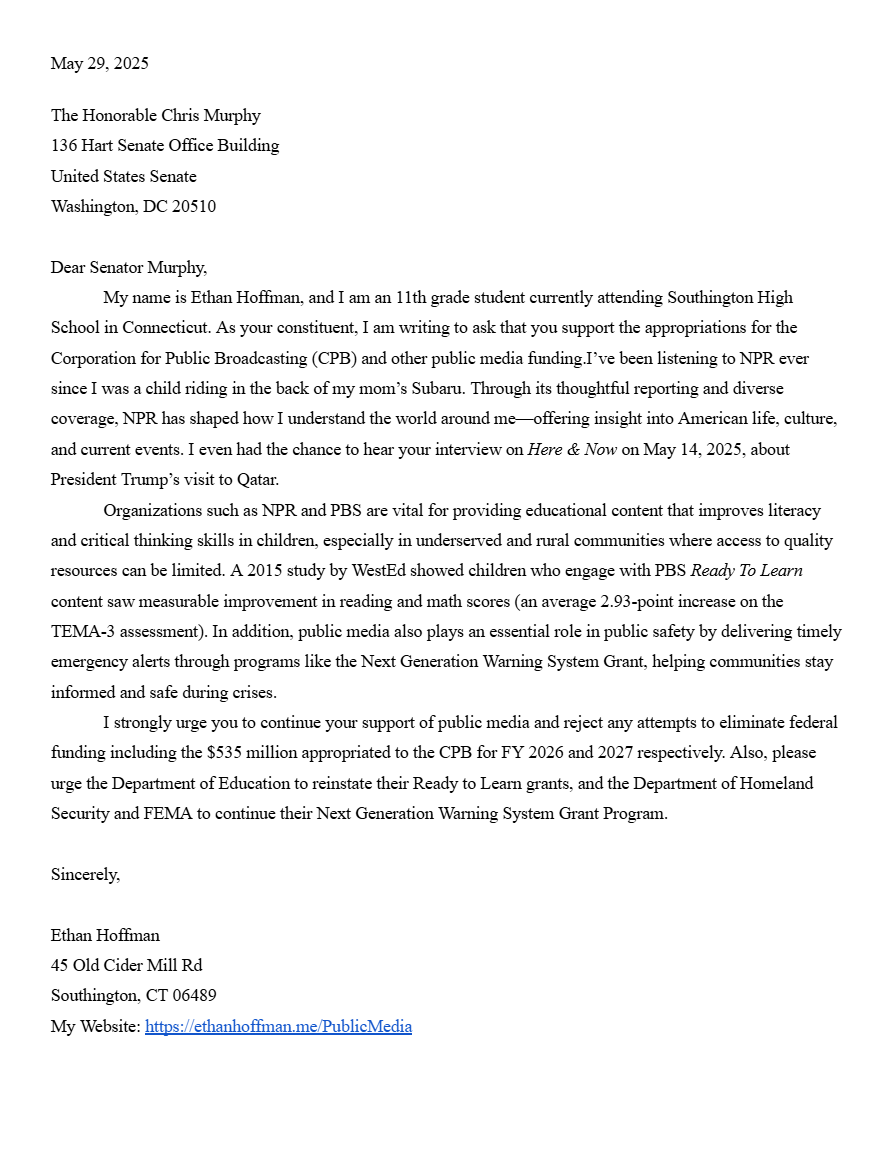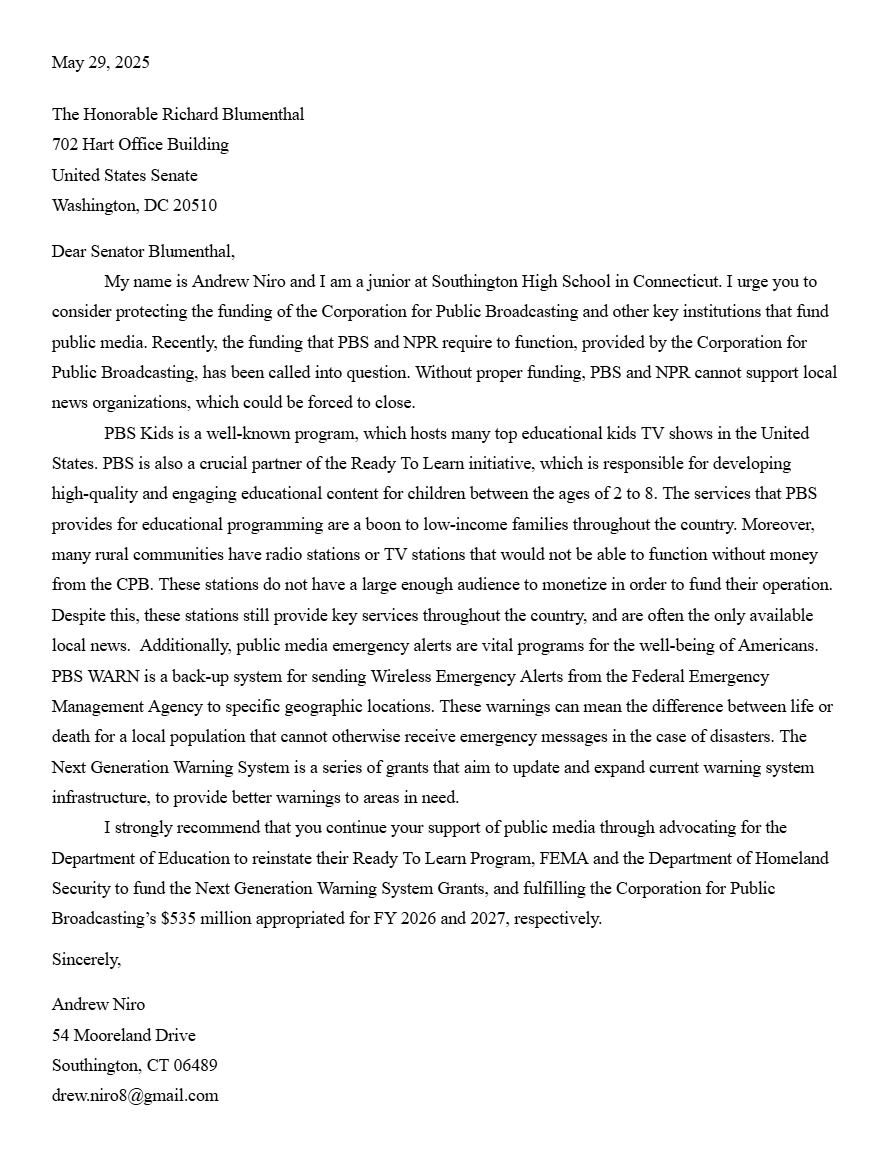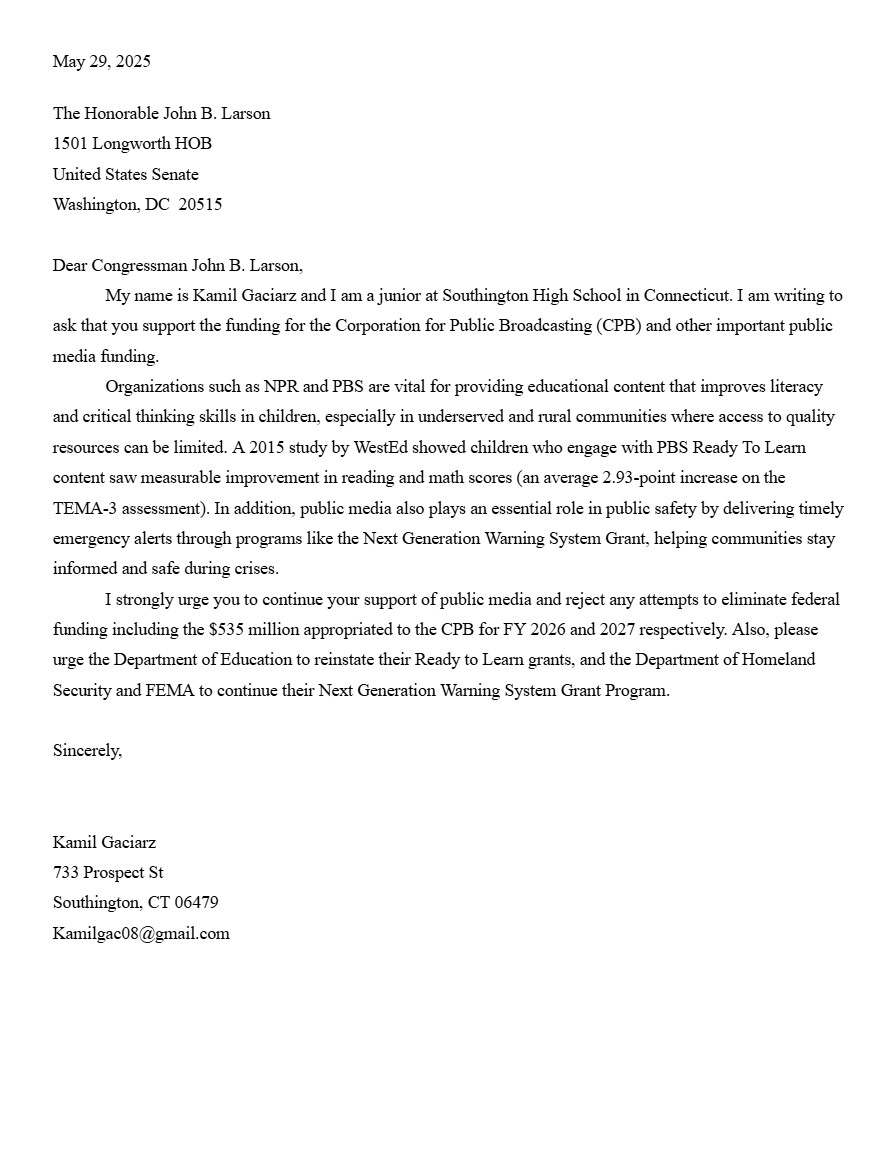Broadcast for All
Linkage Institutions
There are multiple linkage institutions, or structures within society that connect the people to their government, that are involved in the current uncertainty surrounding public media. For example, the media, interest groups, political parties, and elections are all linkage institutions that have had or could have an impact on the issue.
News outlets have covered legislative hearings where PBS leaders defended their funding and some stations that cater to certain ideological groups have taken sides. This kind of coverage has influence in public opinion and indirectly policymakers decisions, when a Congress member believes their constituents feel strongly about a topic, there is a higher likelihood that the member aligns with their constituents viewpoint.
Interest groups like the Free Press, America's Public Television Stations (APTS), and The Alliance of Rural Public Media lobby for continued or increased public media funding. They advocate in Congress, organize petitions, and engage the public to raise awareness of the benefits of public media. On the other side, groups that promote limited government spending or media deregulation may support defunding efforts, arguing that public broadcasting duplicates private sector content or exhibits ideological bias.
Both parties have opinions on the idea of defunding public media, with the Democratic party generally supporting public broadcasting, emphasizing its role in education, civic engagement, and information equity. However, the Republican party often criticizes it as being liberally biased and argue that it should not be publicly funded, especially when budgets are tight. These views shape congressional budget proposals and presidential funding recommendations.
Elections determine the political balance of power in Congress and the White House, both of which control federal budget allocations, including CPB funding. Presidential administrations may issue budget blueprints proposing cuts or increases, but Congress ultimately decides. Public media can become a campaign issue, such as when candidates promise to cut "wasteful spending" or support educational initiatives.
Policymaking
Our desired policy changes are for the US Congress to allocate resources to sustain public broadcasting systems like PBS, NPR, and local community radio and TV stations. The goal is to maintain the independence of public media from commercial interests while providing educational, informative, and culturally relevant programming for all citizens. We would like to see discussion on these policies added to the agenda.
In order to influence our policymakers, we used a federal access point as the federal government controls the appropriations to the Corporation for Public Broadcasting (CPB) which primarily funds public media along with personal donations. Through the appropriations process, Congress determines the level of federal support for the Corporation for Public Broadcasting and the programs it funds. Appropriations is the passing of appropriations bills in Congress to allocate funds to programs and agencies, which then must be approved by the President.
Moreover, as a bureaucratic agency under the Department of Homeland Security, the Federal Emergency Management Agency (FEMA) is responsible for distributing federal funds through grants such as the Next Generation Warning System, providing financial aid to public media to increase coverage for emergency announcements. Also within the bureaucracy, The Department of Education’s Ready To Learn Programming grant has funded the development of educational television and digital media targeted at preschool and early elementary school children and their families, especially those from low-income communities.
The President may propose budgets that include specific allocations for public media, and the White House may influence the direction of policy through recommendations and executive orders. Trump's executive order on May 1st, an order to eliminate federal funding for public media, also demonstrated his power. However, we believe it is an overreach of his power since the executive does not have control over funding.
The courts play an important role in public media funding by ruling on legal challenges related to government actions that affect public media organizations. For example, on May 27th, National Public Radio (NPR) filed a lawsuit against the Trump administration in federal court, demonstrating the judiciary system’s potential to affect the issue as well. Three local public radio organizations, Aspen Public Radio, Colorado Public Radio and KSUT Public Radio, joined NPR as plaintiffs in the case. They argued Trump's May 1st Executive Order was unconstitutional since it limits first amendment rights such as their freedom of speech and the press. The outcome of this case could set important precedent for what executive orders can and cannot do, with the possibility that the court rules in favor of the NPR and protects federal funding for public media.
Actionable Step
As part of our actionable step we sent letters to our Connecticut senators, Chris Murphy and Richard Blumenthal, and our representative, John B. Larson. These letters detailed our request that aid be provided to public media, highlighting the importance of public media to our lives and the lives of others.
The policy we are advocating for is the full funding of the Corporation for Public Broadcasting FY 2026 and 2027 advance appropriations, totaling $535 million respectively. The CPB gets their funding appropriated 2 years in advance, so it is important that Congress does not cancel this funding. 95% of its appropriation is directed to content development, community services, and other local station and system needs, with only 5% allocated to administrative costs. Community Service Grants (CSGs), which go directly to local public television and radio stations, make up 70% of CPB's entire appropriation. Stations have wide latitude to use CSG funds to serve local needs, including community outreach, program purchasing, and local content development.
In addition to the CPB funding, there we are also advocating for the Department of Education's Ready To Learn program. This program, which has historically supported educational content for children, was terminated by the Department of Education in May 2025. The Corporation for Public Broadcasting has expressed concern over this termination, highlighting the program's proven educational value and its bipartisan support over the past 30 years.
Furthermore, we are advocating that the Department of Homeland Security (DHS), through FEMA, will continue funding the Next Generation Warning System Grant Program (NGWS). This program provides grants to public media stations to upgrade and enhance their emergency alert infrastructure. The goal is to improve the resilience, security, and effectiveness of local broadcast systems so they can reliably receive, transmit, and redistribute critical emergency alerts—especially to underserved and rural communities.
Letters to Our National Congress Members
Senator
Chris Murphy

Senator
Richard Blumenthal

Representative
John B. Larson

